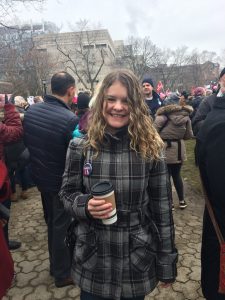March showed “people are going to fight back,” Trenton native says
TORONTO – A strong sense of justice and a passion for change brought Sydney Holmes to the Women’s March last Saturday.

Trenton native Sydney Holmes at the Toronto Women’s March. It wasn’t the first time she had participated in a protest. Photo courtesy Sydney Holmes
Holmes, who was born and raised in Trenton, said she travelled from her Ottawa home to march with 60,000 people to show support for oppressed and marginalized minority groups, to advocate for women’s rights and to stop hate crimes.
Holmes moved to Ottawa six years ago to study sociology at Carleton University and now works with Statistics Canada.
The Toronto Women’s March was organized by a group of volunteers in solidarity with the Women’s March on Washington. The event attracted people not only from the area, but also from other provinces and even from the United States.
Holmes, who said she considers herself an activist and a feminist, has experience participating in demonstrations and protests. When she first heard about the march, back in November 2016, she felt hopeful, she said.
“I was excited. It was the first bit of hope that I felt from the (U.S.) election happening – like people are going to fight back; we’re not going to stand by and let this happen,” she told QNet News prior to the march.
She attended because it is important to stand up against injustice aimed toward oppressed groups, she said.
“I think it’s really important that people get out and participate. And if we can get events consistently that are hopefully as large as the Women’s March … it sends a message that we’re not going to stand by and just let the administration do whatever they want.
“We’re fighting back in our own way, with whatever power we have.”
In light of sexual-assault allegations that new U.S. Donald Trump faces, Holmes recalled her own experience with sexual harassment. She encountered sexism both in school and in the workplace, she said. One of her managers once told the women in her training group that “they had better not bring their time-of-the-month problems to the office.” Some male managers, Holmes said, were “clear misogynists.” Others harassed her on social media.
“It’s very difficult when you’re an entry-level worker to do anything about it. So for a long time all you can do is stand back and take stuff like this – until you’re big enough to actually fight back.”
In the interview before the march, Holmes said she felt it would be effective if it had a big turnout – showing those affected by any form of hate crime that they are not alone: “I think it shows support to minority groups that we’re standing up for them and we’re not going to let them be bullied. I think it allows people to rally together, feel support and feel like it’s not the end of the world.”
After the march – which, like many of those that took place around the world, drew more people than expected – Holmes said she was pleased with its outcome.
“I would say that the march surpassed my expectations. It was so highly attended, ran so smoothly, and was kept peaceful and respectful to all. I really appreciated the way organizers strived for intersectionality and a focus on Canadian issues, not just Trump.
“I think the organizers in Toronto did an amazing job, given the limited time they had.”
It won’t be the last protest she takes part in, she said.
“I absolutely plan to attend any protests or marches that I believe are necessary to petition our government or demonstrate support for those who need it, either in Canada or globally.”
Here’s a map showing the route of the march:
 Print This Post
Print This Post






